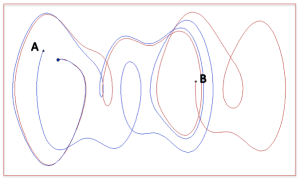 For many years now I have been working in the area that is popularly called chaos theory. One idea that is central to this subject is that for systems that are nonlinear- namely those that do not give an output that is proportional to the input- small changes can have huge consequences. This is variously termed the butterfly effect or (more sedately) sensitive dependence on initial conditions. (The field is replete with evocative names- beyond chaos, there are attractors, some of which are strange, and so on… the image of the “butterfly” on the left is actually a view of an oscilloscope, and comes from a study of the equations that more or less created the field back in 1963…)
For many years now I have been working in the area that is popularly called chaos theory. One idea that is central to this subject is that for systems that are nonlinear- namely those that do not give an output that is proportional to the input- small changes can have huge consequences. This is variously termed the butterfly effect or (more sedately) sensitive dependence on initial conditions. (The field is replete with evocative names- beyond chaos, there are attractors, some of which are strange, and so on… the image of the “butterfly” on the left is actually a view of an oscilloscope, and comes from a study of the equations that more or less created the field back in 1963…)
 The basic idea is a simple one. Were one to plot the evolution of a system schematically as a graph on a sheet of paper, then for nonlinear systems it can happen that starting at one location, the large black dot in the figure on the right, one sets out, over time, to move along the blue line, looping back and forth, to reach the point A after some period of time.
The basic idea is a simple one. Were one to plot the evolution of a system schematically as a graph on a sheet of paper, then for nonlinear systems it can happen that starting at one location, the large black dot in the figure on the right, one sets out, over time, to move along the blue line, looping back and forth, to reach the point A after some period of time.
But were one to start every so closely from the point- even imperceptibly away from there, say the change that might be effected by the flapping of a butterfly’s wings, one would be on the red orbit, staying close to the blue for some time, but eventually moving away in as unpredictable a manner as possible, landing up at B at the same time when the blue line reaches A. The small change in “initial conditions” results in large changes in outcomes…
One is used to this, of course. Setting off marbles (in my head, but also, possibly in reality) from two nearby spots on a mountain peak, could easily lead to them rolling into different valleys- very different outcomes indeed. The “system” of the preceding paragraphs is a catchall for any situation with many variables that change over time- indeed anything that can be suitably abstracted and described by a set of attributes. Systems that have been studied by the methods of chaos theory range from the weather and climate to cardiac problems and the stock market, very diverse areas of interest indeed.
Regrettably, though, the terminology of chaos theory has spawned any number of largely incorrect definitions in the urban dictionary, not to mention the very contrived movies that draw upon the name, and so the public perception of this rather simple and deep idea can be quite flawed. But the metaphor has substance beyond that, whether applying to something as unpredictable as the weather or whether applying to the unpredictability of the human condition… Small changes, different choices, perturbations in the environment- how different the outcomes could have been!
 Surely this strikes a chord. I can recall reading the first papers that described the chaos theory in the late 1970’s and being fascinated by what the implications were. Complexity could come out of very simple structures, the only requirement was nonlinearity. And anybody who has gone shopping, for potatoes or diamonds, it hardly matters which, knows that the price is not a linear function of weight. Other examples can be drawn, but the basic lesson is that most natural systems are nonlinear, and so one should find the effects of chaos everywhere. And one does, all the time!
Surely this strikes a chord. I can recall reading the first papers that described the chaos theory in the late 1970’s and being fascinated by what the implications were. Complexity could come out of very simple structures, the only requirement was nonlinearity. And anybody who has gone shopping, for potatoes or diamonds, it hardly matters which, knows that the price is not a linear function of weight. Other examples can be drawn, but the basic lesson is that most natural systems are nonlinear, and so one should find the effects of chaos everywhere. And one does, all the time!
For many who come to the UoH- the students, the teachers, or for that matter, the administrators- there is a lesson here. What changes should one make, what little extra effort to put in, what to do, or not do… the eventual result can be so different, depending on the initial conditions. In the end, I suppose that state A and state B, whatever they are, should both be acceptable, both being logical outcome of living in a complex world. Does it really matter if a meeting is held on one day or another? Does it matter that colleagues and friends show consideration or not? An exam on one day or another, a lecture given or not? One cannot but think of what might have been, what some other small initial differences in wisdom or generosity might have led to.
But then again, one makes choices, and as Frost put it so eloquently, the difference eventually comes about from the road taken… Or was it the road not taken?

